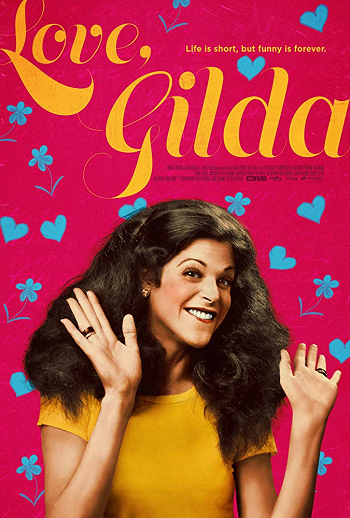
Love, Gilda
LOVE, GILDA (2018)
Featuring Amy Poehler, Melissa McCarthy, Bill Hader, Maya Rudolph, Michael Radner, Judy Levy, Chevy Chase, Martin Short, Lorne Michaels, Paul Shaffer, Cecily Strong, Laraine Newman, Rose Abdoo, Alan Zweibel, Anne Beatts, Rose Schuster, Andrew Alexander, Janis Hirsch, Marcus O’Hara, Stephen Schwartz, Jordan Walker-Pearlman, Pam Zackheim, Robin Zweibel and archival footage of Gilda Radner.
Directed by Lisa D’Apolito.
Distributed by Magnolia Pictures. 86 minutes. Not Rated.
“At one time in my life, I was famous,” Gilda Radner wrote late in her way-too-short life, when the specter of ovarian cancer was taking her from a heartbroken world.
Of course, as was her way, Gilda was being modest. Her show business career may not have had the sizzle it had in her glory period of the 70s, but she was far from being forgotten. She was without a doubt famous, even if illness, some bad career choices, and domestic bliss with second husband Gene Wilder had slowed her career’s forward momentum – or even her interest in pursuing that career.
Sure, she kept her hand in a bit – doing three films (mostly rather critically derided) with Wilder, returning to TV while in remission on a classic cameo on It’s Garry Shandling’s Show and writing her autobiography It’s Always Something, which came out three weeks after she finally succumbed to the disease in 1989.
That’s right, it’s been almost 30 years since Gilda Radner died. It is almost impossible to believe that over a generation of people missed out on the incredible life force that was named Gilda Radner. Well, okay, there are plenty of classic clips of her talent, but they never got to see her live.
However, even before being diagnosed with cancer, Radner was straying from stardom. Her celebrity years, even with the wondrous joys of fame, also ground Radner down. She suffered from depression, insecurity and eating disorders. She was also – probably most of her life – in a constant search for love and happiness, and to a certain extent the idea of a simple suburban life was more attractive to Radner than the crazy, glittery ride of fame she had found herself on.
In fact, as one of her Saturday Night Live co-horts acknowledges here, she was rather needy, dating constantly, always looking for too much too soon. She even married SNL guitarist GE Smith briefly, a short-lived and probably doomed relationship that cracked up when Radner was cast in a movie called Hanky Panky with star comic actor Gene Wilder (Willy Wonka and the Chocolate Factory, Blazing Saddles and Young Frankenstein).
Meeting Wilder may have done no favors to her career (beyond Hanky Panky, she worked with him in a supporting role in The Woman in Red and they co-starred in the gawdawful Haunted Honeymoon), but it made her feel comfortable, wanted, more normal than she ever had.
Which may have been good for Gilda Radner personally, but it was a rather huge loss for the world of comedy.
Love, Gilda reminds us of that loss. It takes us through all of the stages of her nascent career, her growth from a pudgy schoolkid who used humor as a defense to her first real stage recognition (in the Toronto cast of Godspell, which also featured future stars Eugene Levy, Andrea Martin, Victor Garber, Martin Short, and Paul Shaffer). These connections led her to the early days of Second City, then she became the token woman on National Lampoon Radio Hour.
From the Radio Hour, next step was 30 Rock for a new series called Saturday Night Live. (Fellow Radio Hour comics John Belushi, Chevy Chase and later Bill Murray and Brian Doyle-Murray also joined the cast.) The show became a phenomenon, and Radner was one of the shining stars of the cast. Classic clips of Radner’s performances on the show are worth the cost of admission by themselves.
In 1979, she did a popular engagement at the legendary Winter Garden Theater on Broadway. To give you an idea of how big a deal that is, two of the next shows to play at the venue were two of the longest running shows in Broadway history – with Cats (which ran there from 1982 to 2001) and Mamma Mia! (which lasted from 2001 to 2014).
Yet, as is explained here through archival footage of Radner, as well as talking head testimonies from friends and co-workers, Radner was never comfortable with the fame. She tried to do the typical 70s celeb things – parties, drugs, Studio 54, indiscriminate dating – but in the long run she was a homebody.
Then of course, just when she found the contentment she had so long pursued, her body was attacked by cancer. However, it is nice to see through Love, Gilda that she never let the bad things break her. She found peace and serenity even fighting her most difficult battle.
Love, Gilda reminds us of all this; of all that was good in the woman. Gilda Radner was a fighter, a lover, a joker. The world is a lesser place without her.
Jay S. Jacobs
Copyright ©2018 PopEntertainment.com. All rights reserved. Posted: September 21, 2018.
#AlanZweibel #GildaLive #RoseSchuster #HauntedHoneymoon #AndreaMartin #genewilder #LoveGilda #PamZackheim #CecilyStrong #amypoehler #Godspell #snl #ItsAlwaysSomething #EugeneLevy #AndrewAlexander #MelissaMcCarthy #BillHader #JaySJacobs #JanisHirsch #ItsGarryShandlingsShow #JohnBelushi #SecondCity #TheWomaninRed #PopEntertainmentcom #BillMurray #MarcusOHara #StephenSchwartz #chevychase #GildaRadner #MichaelRadner #NationalLampoonRadioHour #lornemichaels #HankyPanky #saturdaynightlive #mayarudolph #LaraineNewman #JordanWalkerPearlman #MartinShort #LisaDApolito #AnneBeatts #JudyLevy #PaulShaffer #moviereview #BrianDoyleMurray #RobinZweibel #RoseAbdoo


Comments